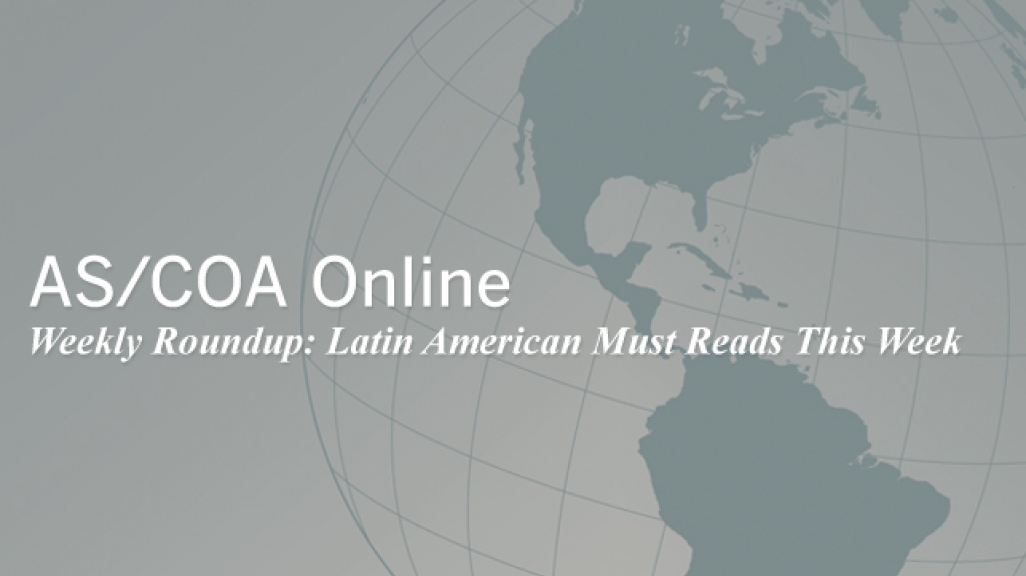Weekly Roundup: Biden's LatAm Tour, Colombia's Electoral Reform, Bachelet's First 100 Days
Weekly Roundup: Biden's LatAm Tour, Colombia's Electoral Reform, Bachelet's First 100 Days
The Pacific Alliance presidents meet in Mexico, U.S. support for the Cuba embargo declines, and the State Department looks at human trafficking. Read these stories and more.
Biden hits the road for LatAm tour. U.S. Vice President Joe Biden visited four Latin American countries this week, starting with Brazil on June 15. He held a fence-mending meeting with President Dilma Rousseff in a bid to “rebuild trust” after last year’s National Security Agency scandal, and he attended the U.S.-Ghana World Cup match. In Colombia, he gave his support for the peace talks during a conversation with President Juan Manuel Santos. In an interview with Colombian daily El Espectador, Biden commented on closing Guantanamo Bay, noting the administration supports Latin American countries taking former prisoners. Also, Biden talked about the Dominican Republic’s immigration reform in Santo Domingo. On June 20, the vice president extended his trip in order to visit Guatemala to discuss the plight of children migrants in the United States. He will meet with the presidents of Guatemala and El Salvador as well as and senior-level Honduran officials, including the first lady and foreign minister.
Find out about the U.S. administration’s policies on Latin America in an address Biden gave at COA’s 2013 Washington Conference.
Reelected Colombian president proposes electoral reform. A day after winning reelection, President Juan Manuel Santos announced plans to eliminate presidential reelections in the country and instead extend a single term to five or six years. Support in Congress suggests the reform will pass during Santos’ second term—which begins August 7—and will go into effect in 2018.
Understand the implications of Santos’ reelection in a World Politics Review article by COA’s Eric Farnsworth.
Chile’s president completes 92 percent of promised measures in first 100 days. President Michelle Bachelet delivered nearly all of the measures she proposed during her election campaign as she completed her first 100 days in office this week. The president introduced her public health plan on June 18 to complete 46 out of 50 campaign promises.
Discover what’s next for Bachelet’s administration at AS/COA’s June 27 Santiago conference.
Pacific Alliance presidents congregate in Mexico. Presidents from the Pacific Alliance bloc—Chile, Colombia, Mexico, and Peru—meet in Punta Mita, Mexico for the group’s ninth summit June 20. Mexico takes over the bloc’s pro-tempore presidency as leaders plan to talk about migration, labor exchanges, and financial integration, among other topics. Presidents will also discuss Costa Rica and Panama—countries on track to become members. On June 19, foreign ministers signed an agreement that will grant 300 work visas a year to youth for travel among the four countries.
Learn about how the Pacific Alliance emerged and what it intends to do.
New poll shows record low support for Cuban embargo in Miami. Florida International University surveyed Cubans in Miami and found that 52 percent of respondents opposed the embargo and 69 percent favored unrestricted travel to the island. Roughly 48 percent backed the embargo—a 39 percent drop from 1991. Changing attitudes could have electoral implications as the number of Cuban-Americans registered as Democrats has doubled over the same period, reports The Wall Street Journal.
Read more about changing attitudes toward Cuba in Florida in a Politico article by AS/COA’s Christopher Sabatini.
Human trafficking ranking: how did the Americas fare? On June 20, the State Department released its annual Trafficking in Persons report, ranking countries on efforts to prosecute offenders and provide assistance to victims. Results for the Americas were mixed; Canada, the United States, and Nicaragua retained their spots in the ranking’s first tier, made up of countries that have strongest efforts to combat trafficking. Chile was upgraded to the top tier this year, while Colombia was downgraded for not complying with the minimum standards to eliminate trafficking. Cuba and Venezuela scored worst in the region.
Hear U.S. Homeland Security Secretary Jeh Johnson share his views on security and migration in the Americas.







